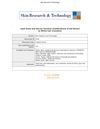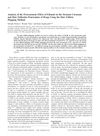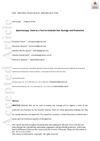October 2022 in “Frontiers in Bioengineering and Biotechnology” Bioengineered nanoparticles can effectively treat hair loss by targeting specific enzymes and receptors.
 149 citations,
September 2017 in “Pharmaceutics”
149 citations,
September 2017 in “Pharmaceutics” Pig skin is a good substitute for human skin to measure drug absorption, but differences in skin structure and enzymes across species must be considered.
 3 citations,
January 2022 in “Pharmaceutics”
3 citations,
January 2022 in “Pharmaceutics” Nanostructured delivery systems could potentially improve hair loss treatment by targeting drugs to hair follicles, reducing side effects and dosage, but the best size, charge, and materials for these systems need further investigation.
 2 citations,
January 2012 in “Hair therapy & transplantation”
2 citations,
January 2012 in “Hair therapy & transplantation” DDAIP-HCl significantly increases minoxidil absorption into the skin.
 3 citations,
September 1989 in “Journal of Investigative Dermatology”
3 citations,
September 1989 in “Journal of Investigative Dermatology” Methyl caprate greatly increases drug absorption through the skin and is better than other enhancers.
 12 citations,
February 2019 in “Skin research and technology”
12 citations,
February 2019 in “Skin research and technology” White hair has less lipid content and absorbs water differently than brown hair.
181 citations,
July 2004 in “Journal of controlled release” Smaller nanoparticles improve minoxidil absorption through hair follicles.
 1 citations,
July 2005 in “Drugs and the pharmaceutical sciences”
1 citations,
July 2005 in “Drugs and the pharmaceutical sciences” Targeting drugs to hair follicles can treat skin conditions, but reaching deep follicle areas is hard and needs more research.
79 citations,
December 2017 in “Cosmetics” Effective sunscreen formulations can reduce skin absorption and enhance protection.
 1 citations,
May 2014 in “Lipid Technology”
1 citations,
May 2014 in “Lipid Technology” New cleaning surfactants, biofuel production plans, dairy expansions, improved lipid testing methods, and various product launches and developments were reported in lipid technology.
 15 citations,
February 2023 in “Colloids and surfaces. B, Biointerfaces”
15 citations,
February 2023 in “Colloids and surfaces. B, Biointerfaces” Smaller curcumin nanocrystals penetrate skin better, but additives and particle size affect absorption and accumulation.
 55 citations,
June 2013 in “Dermatologic Surgery”
55 citations,
June 2013 in “Dermatologic Surgery” Ablative fractional resurfacing could improve how well topical drugs penetrate the skin, but more research is needed to fine-tune the method.
 11 citations,
January 2018 in “RSC Advances”
11 citations,
January 2018 in “RSC Advances” Cedrol cream is more effective and safe for promoting hair growth than traditional treatments.
 5 citations,
July 2003 in “Drug Development Research”
5 citations,
July 2003 in “Drug Development Research” Fluridil promotes hair growth safely and effectively for androgenetic alopecia.
 43 citations,
February 2020 in “Clinica chimica acta”
43 citations,
February 2020 in “Clinica chimica acta” Nano-sized plant-based chemicals could improve cervical cancer treatment by being more effective and causing fewer side effects than current methods.
 October 2022 in “Journal of Kermanshah University of Medical Sciences”
October 2022 in “Journal of Kermanshah University of Medical Sciences” Different substances can affect how well the skin absorbs minoxidil, a hair loss drug. Caprylic acid helps the skin absorb it the best, followed by propylene glycol and water.
 14 citations,
May 2022 in “Asian Journal of Pharmaceutical Sciences”
14 citations,
May 2022 in “Asian Journal of Pharmaceutical Sciences” New hair follicle-targeting treatments show promise for hair disorders but need more research on safety and effectiveness.
 25 citations,
December 2013 in “Journal of Investigative Dermatology Symposium Proceedings”
25 citations,
December 2013 in “Journal of Investigative Dermatology Symposium Proceedings” New methods like nanoparticles and microneedles show promise for better skin drug delivery, especially for hair disorders.
 10 citations,
January 2014 in “Chemical and Pharmaceutical Bulletin”
10 citations,
January 2014 in “Chemical and Pharmaceutical Bulletin” Ethanol pretreatment affects drug penetration through skin and hair follicles.
 85 citations,
January 2007 in “Journal of Drug Targeting”
85 citations,
January 2007 in “Journal of Drug Targeting” Liposomes better deliver minoxidil for hair loss treatment than niosomes.
 62 citations,
December 2013 in “Aaps Journal”
62 citations,
December 2013 in “Aaps Journal” Squarticles effectively deliver hair growth drugs to follicles and dermal papilla cells.
 2 citations,
November 2018 in “International Journal of Cosmetic Science”
2 citations,
November 2018 in “International Journal of Cosmetic Science” Chamomile extract can protect hair from damage caused by light.
 September 2018 in “Cosmetics”
September 2018 in “Cosmetics” Inositol and arginine solutions improve hair follicle health and turnover.
 434 citations,
October 2003 in “PTR. Phytotherapy research/Phytotherapy research”
434 citations,
October 2003 in “PTR. Phytotherapy research/Phytotherapy research” Natural products in cosmetics are beneficial for skin and hair care with low toxicity.
 355 citations,
August 2013 in “Acta Biomaterialia”
355 citations,
August 2013 in “Acta Biomaterialia” The nanofibers with two growth factors improved wound healing by supporting structure, preventing infection, and aiding tissue growth.
 58 citations,
March 2013 in “Human Reproduction Update”
58 citations,
March 2013 in “Human Reproduction Update” Products should be called 'sperm-safe' only after thorough, well-designed tests.
 57 citations,
September 2017 in “Journal of controlled release”
57 citations,
September 2017 in “Journal of controlled release” Nanocarrier-loaded gels improve drug delivery for cancer, skin conditions, and hair loss.
 52 citations,
November 2013 in “European Journal of Pharmaceutical Sciences”
52 citations,
November 2013 in “European Journal of Pharmaceutical Sciences” Chitosan-decorated polymersomes improve finasteride delivery for hair loss treatment.
 41 citations,
October 2000 in “Dermatologic clinics”
41 citations,
October 2000 in “Dermatologic clinics” Better hair care products are needed to protect against grooming and chemical damage.
 40 citations,
November 2017 in “International journal of nanomedicine”
40 citations,
November 2017 in “International journal of nanomedicine” DA liposomes with chloramphenicol effectively target hair follicles and combat MRSA with minimal skin toxicity.


























